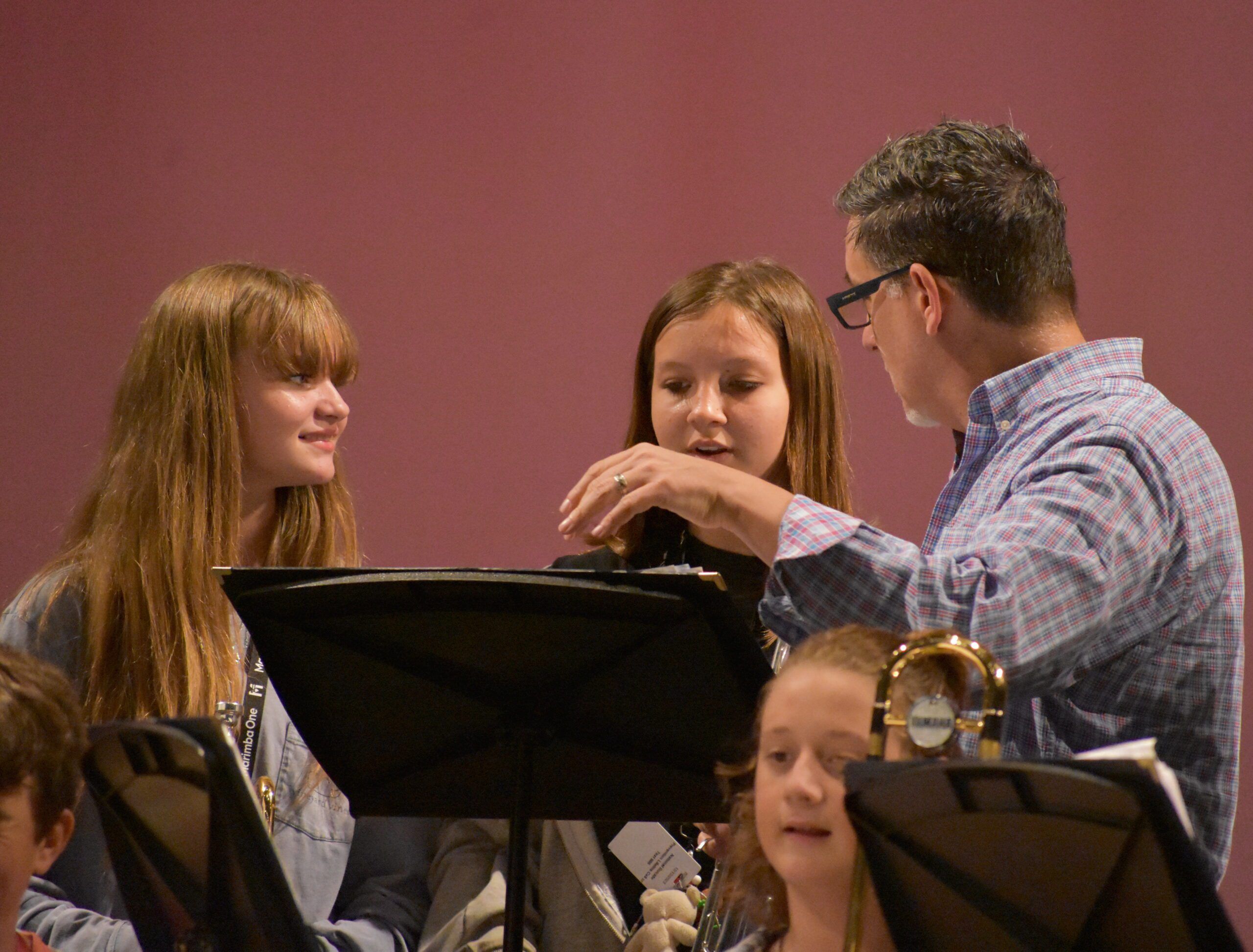Trumpeter visit jazzes up Lemon Bay’s orchestra program

Trumpeter Rex Richardson, who has played with many of the greats of jazz, gave students at Lemon Bay High School lessons in music, and life, at a Friday seminar sponsored by the Punta Gorda Symphony. Richardson said that no matter what they improvise, the students should never forget the harmony and form, and “always kind of hang onto the melody.”
“It’s about being really precise with articulations,” said Richardson. “It makes the notes come off the page.”
Richardson, a professor at Virginia Commonwealth University, is acclaimed as one of the best jazz trumpeters in the world, and has worked with the ensemble Rhythm & Brass, jazz legend Joe Henderson’s Quintet and Sextet, William Russo’s Chicago Jazz Ensemble, and the Brass Band of Battle Creek.
He has had hundreds of solos across six continents, including the Thailand Philharmonic, the Tokyo Symphonic Winds, England’s Fodens Brass Band, and the U.S. Air Force’s Airmen of Note Jazz Ensemble. He was in Southwest Florida for a Sunday concert of the Punta Gorda Sympthony and their performance of Dvořák Symphony No. 9, “From the New World.”
The two-hour workshop was put together by the instrument store Cadence Music, and supported by Yamaha, the instrument maker. Todd Handley, principal tuba player for the symphony, is also a manager with Cadence Music. He reached out to the instrument maker Yamaha to pay for Richardson to come in and work with students.
“Cadence is big on community outreach. They brought him in a couple of days early,” said Jennifer Bitner, executive director of the symphony. She attended and watched the workshop, held in the Lemon Bay Performing Arts Center, which is at the entrance to the school.
“The way we see it, they are the orchestra members of the future,” said Bitner. “It gives them the experience and opportune to grow with the music.”
Two different music programs participated, both L.A. Ainger Middle School and Lemon Bay High School. With the L.A. Ainger Middle School students, Richardson started with the basics, but the students, under the direction of Tim Ostrow, were ahead of him. He asked if L.A. Ainger Cougar Band if they knew the Dorian scale, or Dorian mode, which is essentially lowering the third note of the scale by a half step, to achieve more interest in a scale.
“That’s unusual for a middle school,” said Richardson.
He spoke to the middle school students, all comfortable on the stage, like old pros. Jazz and blues, Richardson said, were very much like a spoken language, reminding that we improvise while we speak. For all the students, the emphasis was on practice, and pushing through errors.
“We have to stick with it even when it feels like it is going wrong,” said Richardson. “If it’s not terrible sounding, no one will notice that much.”
The high school session was under the direction of Philip Eyrich. Eyrich, who is also director of music ministries for Lighthouse United Methodist Church, is familiar to island residents as his Lemon Bay students perform for programs supported by the Boca Grande Woman’s Club.
Richardson took questions from Eyrich’s high schoolers. One student asked how they might come up with ideas, and where the notes might come from and how they could come from his fingertips.
“Spend some time practicing,” said Richardson. ”Jazz masters practice more than many musicians I know, so that the stuff they have in their heads comes out.”
As in any art, reading and listening to the masters always helps move the artist forward. Richardson told the students that practicing by listening to those masters helps performers to internalize their forms, and then they can adapt them. He talked about the idea of jazz transcription, citing the work of Chet Baker.
“The first thing I want to learn is what my heroes do,” said Richardson. “A lot of what I am going to play is taken from the recordings I admire.”
The questions from the students from both middle and upper schools were complex, and evidence of many old souls in the bunch. A student asked if he should play with more “closed voicing.” That is where chord has the top and bottom notes falling within an octave.
“It depends on what’s happening,” said Richardson. “You just want to stay out of their range.”
One issue was how the students should carry themselves on the stage, as many play classical, band and jazz styles and need to learn how to negotiate the different performance idioms. During a practice of Dizzy Gillespie’s “A Night in Tunisia” he talked not only about the sound, but how you present it with the brass.
“Try to avoid assuming any weird positions when playing,” said Richardson. “Just try to stay natural.”
In the teaching, Richardson, who has an educational music channel on Youtube, was careful to balance critique and lesson. He asked individuals to do solos, and then would ask for “a little more energy with it. A little more sound.”
The workshop got into the particulars of live jazz performance, as some of the students are already performing, including their own work at school and at places like The Grill at 1951 in Port Charlotte, which is a serious jazz club with live music almost every night. At one point, one of the students asked to play one of the jazz standards. They went for a few minutes with riffs on “All of Me” the standard by Gerald Marks and Seymour Simons.
“It’s ok to fail, it’s probably most important as a jazz musician,” said Richardson. “Little errors might happen, but the music might still be great.”








